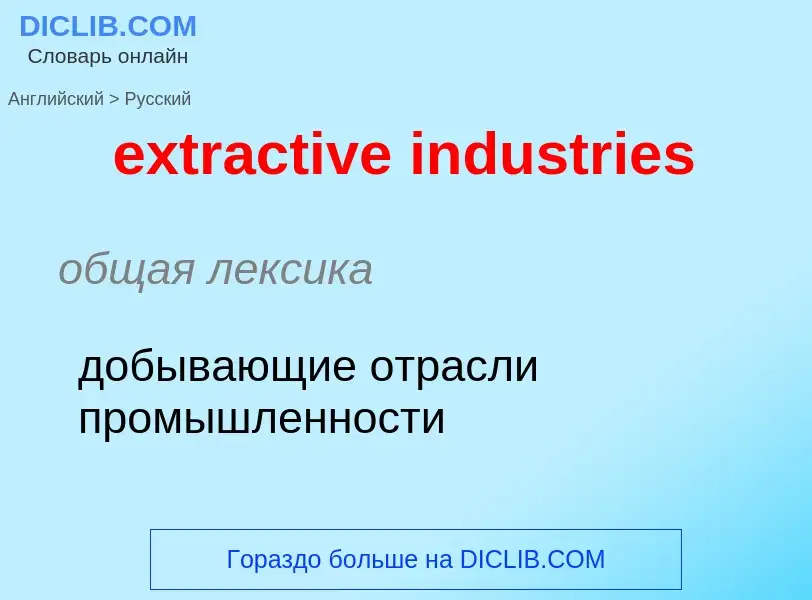Μετάφραση και ανάλυση λέξεων από την τεχνητή νοημοσύνη ChatGPT
Σε αυτήν τη σελίδα μπορείτε να λάβετε μια λεπτομερή ανάλυση μιας λέξης ή μιας φράσης, η οποία δημιουργήθηκε χρησιμοποιώντας το ChatGPT, την καλύτερη τεχνολογία τεχνητής νοημοσύνης μέχρι σήμερα:
- πώς χρησιμοποιείται η λέξη
- συχνότητα χρήσης
- χρησιμοποιείται πιο συχνά στον προφορικό ή γραπτό λόγο
- επιλογές μετάφρασης λέξεων
- παραδείγματα χρήσης (πολλές φράσεις με μετάφραση)
- ετυμολογία
extractive industries - translation to ρωσικά
общая лексика
добывающие отрасли промышленности
общая лексика
добывающая промышленность
Ορισμός
Βικιπαίδεια
The Extractive Industries Transparency Initiative (EITI) is a global standard for the good governance of oil, gas and mineral resources. It seeks to address the key governance issues in the extractive sectors.
The EITI Standard requires information along the extractive industry value chain from the point of extraction, to how the revenue makes its way through the government and its contribution to the economy.
This includes how licenses and contracts are allocated and registered, who the beneficial owners of those operations are, what the fiscal and legal arrangements are, how much is produced, how much is paid, where the revenue is allocated, and its contributions to the economy, including employment.
The EITI Standard is implemented in 55 countries around the world. Each of these countries is required to publish an annual EITI Report to disclosing information on: contracts and licenses, production, revenue collection, revenue allocation, and social and economic spending.
Every country goes through a quality-assurance mechanism, called Validation, at least every three years. Validation serves to assess performance towards meeting the EITI Standard and promote dialogue and learning at the country level. It also safeguards the integrity of the EITI by holding all EITI implementing countries to the same global standard.
Each implementing country has its own national secretariat and multi-stakeholder group made up of representatives from the country's government, extractive companies and civil society. The multi-stakeholder group takes decisions on how the EITI process is carried out in the country.
The EITI Standard is developed and overseen by an international multi-stakeholder Board, consisting of representatives from governments, extractives companies, civil society organisations, financial institutions and international organisations.
The current Chair of the EITI Board is Helen Clark, Former Prime Minister of New Zealand and former UNDP Administrator. The previous chairs have been Fredrik Reinfeldt, former Prime Minister of Sweden, Clare Short (2011-2016), former UK Secretary of State for International Development and Peter Eigen (2009-2011). The EITI International Secretariat is located in Oslo, Norway and is headed by Mark Robinson.







